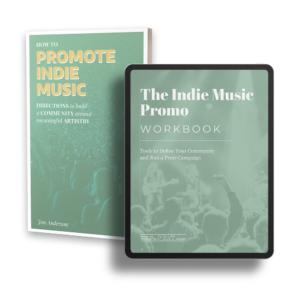Two questions that made me think this week:
Who are three artists you’ve recently become a fan of?
(If you’re debating what it means to be a “fan,” a good barometer is that if the artist toured through your town, you’d want to go see them.)
How did you become a fan of them?
(There are often two stages to “fandom” – the point at which you first hear the artist, and the point at which you determine you’re definitely into them. These points often happen together, but not always. If you can, note when both points were.)
I think about this kind of stuff – the process of fan building – a lot.
But I realized this week that I usually think about “becoming a fan” as something that happens to other people – to some vague group of people “out there” who I think of as the public or social media users. I’ve often been disinterested in (or just naive about) the processes by which I’ve become a fan.
When I asked myself these questions, here’s what I got:
1. Novo Amor. A friend told me 2018’s Birthplace was awesome. I checked it out and enjoyed it, but wasn’t fully hooked until I heard 2020’s Cannot Be, Whatsoever, which came up on my Spotify Release Radar. Those soundscapes are awesome.
2. Leif Vollebekk. When I was working on my most recent project, my producer played me “Elegy” as inspiration for one of the tracks. I was immediately hooked.
3. Phoebe Bridgers. Someone (I think my brother) told me to listen to “Motion Sickness”, then all of Stranger in the Alps. The songwriting immediately slayed me. Punisher did it again.
I think what’s interesting about this is that each of the artists I thought of was personally introduced to me by someone who knew me well.
But it kind of makes sense, and here’s why: Most of the non-personal methods for finding fans focus on matching the song rather than on matching the artist.
Ads are run for songs, not for artists. Playlists place songs, not artists. The radio plays songs, not artists.
To make it concrete, take Spotify, for example. Spotify is incredibly good at showing me songs that I’ll probably like or that I’ll probably be in the mood for. Their Summer Hits playlist, for example, puts JBieb’s “Peaches” next to JP Saxe’s “Like That”. When I’m bopping to that playlist, it works. But most Beliebers are probably not going to be fans of JP Saxe, too.
Of course, Spotify also has a “Fans Also Like” section, which is their best shot at telling you which artists you should check out. I’ve found plenty of good tracks by clicking through it – but it’s rarely led me to become a fan of an artist.
People are better at helping other people become fans.
Why are people better at making fans?
Two reasons, I think:
1. People are able to give better suggestions because they have way more context than algorithms (even brilliantly designed ones).
My friend who told me about Novo Amor knew the kind of songs I was writing at the time. He knew I’d been listening to a lot of Bon Iver. He knew I like camping and that I’m a sucker for nostalgia. He knew me. And he knew Novo Amor.
Spotify’s algorithm knows what I listen to – but it doesn’t even know all of it, because I also listen on YouTube and still-relevant CDs. It knows what Novo Amor sounds like, but it doesn’t know that all of his merch is sustainably made or that his artwork is created by Tilleke Shwarz.
Technology is crazy, yeah, but people still have fuller and deeper context on their friends than algorithms do.
2. Social ties matter.
Hearing my producer wax eloquent about Leif Vollebeck convinced me that “Elegy” was awesome just as much as its lyrics did. Every time I listen to that track, I think of him and that session.
There are no social ties when I click “Fans Also Like” and dig a track. Even if I see that one of my friends liked an artist on Facebook or that they’re listening to a track on Spotify, I’m not hearing them talk about it or seeing them close their eyes and jam out.
Without other people, I’m less likely to attach a memory to an artist. Without memories, I’m less likely to become a fan.
So, what’s the point?
The point is not that people don’t find new music through Spotify or that marketing doesn’t work. People do and marketing does – both for exposing people to new music and for transitioning people into deeper fan relationships.
As I charted out my fandom further, I think I’m about 3x more likely to become a fan through personal relationships than I am through automation or algorithms – which means algorithms still work. And they’re only getting better.
The point is that people are still the focus.
Two practical takeaways:
1. Build up your biggest fans. Make them feel like VIPs and they’ll bring others into the fold. I’ve said before that 80% of your marketing efforts should be focused on people who are already fans of your music – still think it’s true.
2. Keep in mind that the goal of any marketing should be to create community around your artistry – not just to rack up streams on a single.
I realize I’ve made similar points before, but I keep coming back to this stuff because I keep finding new reasons that community matters.
Hope it’s helpful as you think about what matters to you.

